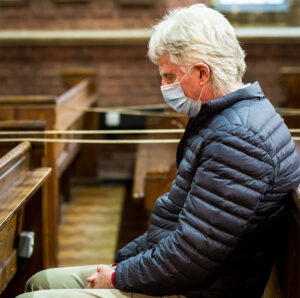Church leaders continue to grapple with tough decisions regarding worship, other ministries
By Lonnie Wilkey
Editor, Baptist and Reflector
[email protected]
 FRANKLIN — A new year has begun, but church leaders must continue to address a question that has been present since the onset of COVID-19 nearly a year ago: Do we have live-person or virtual services?
FRANKLIN — A new year has begun, but church leaders must continue to address a question that has been present since the onset of COVID-19 nearly a year ago: Do we have live-person or virtual services?
As COVID-19 cases continued to rise dramatically in Tennessee last month, Governor Bill Lee issued an executive order Dec. 20 declaring “a continuing state of emergency and major disaster in order to facilitate the response to COVID-19.”
During a statewide address on Dec. 20, Lee exhorted Tennesseans to “make some hard decisions.” He noted 10,000 Tennesseans are getting sick every day and 100 people are dying daily from COVID. “We are in a war. With the arrival of the first vaccine, we have launched an offensive that will end this war, but the next few weeks will be critical,” Lee stressed.
As of Jan. 4, 2021, there have been 608,297 reported cases of coronavirus and 7,025 deaths in Tennessee. A reported 526,966 people have recovered from the virus.
Lee encouraged Tennesseans to not gather with people outside their households. In his executive order, he limited indoor public gatherings to no more than 10 people.
He also encouraged employers to allow their employees to work from home if possible, and if not, masks should be worn.
The governor stopped short of issuing a statewide mask mandate, noting that 70 percent of communities in the state already have mandates and that 80 percent of state residents report they wear masks. “Masks work,” he said.
Lee’s executive order does not apply to churches, weddings or funerals, but it strongly encouraged places of worship “to continue to utilize virtual or online services and gatherings” and follow the Guidance for Gathering Together in Places of Worship issued by the Governor’s Office of Faith-Based and Community Initiatives regarding in-person services that can be conducted safely.
The executive order also called for persons attending funerals or weddings to follow health guidelines and maintain social distancing. It also encouraged “that any large public celebration of weddings or funerals be postponed or attended only by close family members.”
In response to the later executive order, Randy C. Davis, president and executive director of the Tennessee Baptist Mission Board, observed that “our pastors and ministry leaders know how to best love their communities and lead their churches during this pandemic.”
Davis noted that the new executive order requests churches to continue to utilize virtual services. “It is important to note that churches are not mandated to do so,” he said.
At the same time, church leaders need to recognize the outbreaks of COVID-19 in the state “are more severe than we experienced previously. I am confident our leaders and churches will do everything they can to help prevent the spread of this disease.”
Bruce Chesser, president of the Tennessee Baptist Convention and senior pastor of First Baptist Church, Hendersonville, agreed.
“From the very beginning of the health crisis Gov. Lee has recognized the importance of churches in the mental, physical and spiritual condition of the communities across Tennessee,” Chesser noted.
“While he has encouraged us to be safe and prudent, he has continued to leave us free to follow the Lord’s direction in our unique situations. Every church is different. The size of our buildings and the opportunities that we have to provide social distancing and safe opportunities to meet in person are all unique to each church.
“What is right for one church, might not be right for another,” the TBC president observed. “I deeply appreciate Gov. Lee for continuing to trust the leaders of the churches across Tennessee to make good decisions. We need to be safe. We need to be smart. But, most of all, we need to seek the Lord’s direction in what we should each do as individual churches,” Chesser added.
In Lee’s closing remarks, he encouraged Tennesseans to join in the effort to combat the disease. “We are in a cold, cruel phase of this pandemic,” he said. “It will get worse before it gets better. I know you are tired, but we have got to double down.”
